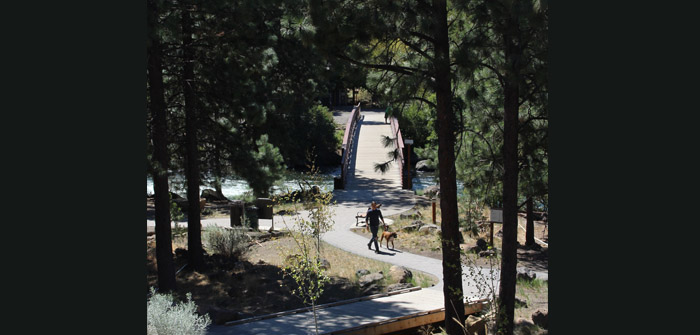(First Street Rapids Park | Photo courtesy of Bend Parks and Recreation)
Survey & Three Virtual Public Meetings Scheduled This Month
Bend Park and Recreation District (BPRD) is planning for recreational access and riparian habitat restoration at parks along the Deschutes River, and public input is needed on a preliminary list of possible projects.
BPRD has 16 parks along the Deschutes River, which include 25 designated access points and over 94 user-created access points to facilitate play in the water. The popularity of river use has resulted in impacts such as trampled vegetation, user-created access paths and erosion along the riverbank. With the river plan, the district is taking a proactive approach to identify and recommend river access and habitat restoration projects, likely over the next 10 years, with a combination of district general funds partnerships and grants.
At the midpoint of the two-year plan development process, the district is seeking public feedback on 33 potential projects through a survey and virtual community meetings.
- An online survey (English and Spanish languages) is open now through February 28 for residents to share comments and feedback on proposed projects. The survey is estimated to take 15-20 minutes.
- Public meetings will be facilitated virtually with phone only and video participation options on the following dates/times:
- Thursday, February 18, 6pm on Zoom
- Saturday, February 20, 10am on Zoom
- Saturday, February 20, 3pm on Zoom (in Spanish language)
- Login details for each virtual meeting are available here.
Possible projects seeking feedback
Two locations with designated access points have been identified for potential changes. The Columbia Park river access would be possibly closed and revegetated, and one of Miller’s Landing Park access points would possibly be closed.
The Columbia Park watercraft access point has severely eroded since it was constructed in 2012, and the erosion is impacting the trail. The park has also been overused in recent years by people illegally jumping off the bridge. This has created a safety concern that led to a temporary closure in summer 2020.
At Miller’s Landing Park a possible project is proposed to close and revegetate the northern access point, and, concurrently, make improvements to the boardwalk access. The improvements are expected to include elements to improve ease of getting into and out of the water for all users.
In addition, a number of user-created access points would possibly be closed and revegetated at multiple locations including River Rim Park, Farewell Bend Park, First Street Rapids Park and Sawyer Park.
Access options for four-legged friends are also proposed for public input in the survey and the virtual public meetings. Leashed dogs are welcome at all BPRD river access points. Additionally, the district offers eight off-leash areas for dogs, including one with river access. The existing river access area is located adjacent to Riverbend Park, on private property, currently leased by the district. The temporary use of the leased property is expected to end and the existing river off-leash area will no longer be available for lease by the district. BPRD is working to identify other potential locations for off-leash river access.
“Community input is an integral part of the plan development process,” said Sarah Bodo, district planner and project manager. “This plan’s goal is to strike a balance between recreation access and restoration, and it will be the highest quality with input from the community members the plan is intended to serve.”
There will be numerous opportunities to participate in shaping the plan including community surveys, virtual open houses and board meetings.
BPRD received a grant for technical assistance from the National Park Service, Rivers and Trails Conservation Assistance program (NPS-RTCA) for the completion of the plan. Together with NPS-RTCA, the district planning team convened a focus group with representatives from local recreational and environmental organizations and agencies to seek their input.
For more information about the river access and habitat restoration plan or to sign up for email updates, visit the Deschutes River Access and Habitat Restoration Plan project.





